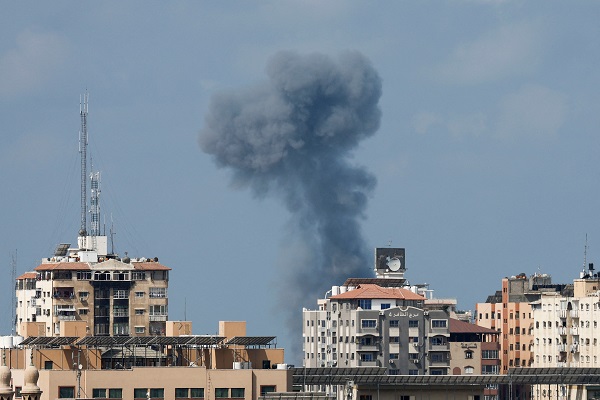 Smoke rises during an Israeli air strike, amid Israel-Gaza fighting, in Gaza City, 6 August 2022;
Credit: Reuters / Ibraheem Abu Mustafa
Smoke rises during an Israeli air strike, amid Israel-Gaza fighting, in Gaza City, 6 August 2022;
Credit: Reuters / Ibraheem Abu Mustafa
GAZA (Reuters) - Israeli aircraft struck in Gaza and Palestinians fired rockets at Israel on Saturday 6 August 2022 after an Israeli operation against the Islamic Jihad militant group ended more than a year of relative calm along the border.
Israel launched an operation against Islamic Jihad on Friday 5 August 2022, killing one of the group's senior commanders in a surprise daytime air strike on a high-rise building in Gaza City and drawing rocket salvoes in response.
Further escalation would largely depend on Hamas, the Islamic militant group which controls Gaza, and whether it would opt to join the fighting.
The Israeli strikes have killed eleven Palestinians, including at least four more Islamic Jihad militants and a child, and have wounded at least 80 people, according to the Palestinian Health Ministry.
Islamic Jihad did not provide precise details on how many of its members had been killed.
The Israeli military said its jets targeted two militants preparing to launch rockets in a fresh strike on Saturday. Overnight it apprehended nineteen Islamic Jihad militants in raids in the Israeli-occupied West Bank while targeting the group's rocket manufacturing sites and launchers in Gaza.
Palestinian militants have fired at least 160 rockets over the border, the military said, some deep into Israel, at cities near the commercial hub Tel Aviv. Most of the missiles were intercepted and a few people were lightly injured while running to shelters.
Egypt, the United Nations (UN) and Qatar are attempting to mediate an end to the violence "but no breakthrough yet", according to a Palestinian official with knowledge of the matter.
Islamic Jihad signalled no immediate ceasefire. "The time now is for resistance, not a truce", a group official told Reuters.
Concern
Around 2.3 million Palestinians are packed into the narrow coastal Gaza Strip, with Israel and Egypt tightly restricting movement of people and goods in and out of the enclave and imposing a naval blockade, citing security concerns.
The frontier had been largely quiet since May 2021, when eleven days of fierce fighting between Israel and militants left at least 250 in Gaza and thirteen in Israel dead.
The UN Mideast envoy Tor Wennesland said he was deeply concerned about the violence and the Western-backed Palestinian Authority condemned Israel's attacks.
Gaza streets were largely deserted and shops remained closed early on Saturday. At the site where top Islamic Jihad commander Tayseer al-Jaabari was killed, rubble, glass and furniture were strewn along the street.
A neighbour, Mariam Abu Ghanima, 56, said the Israeli military did not issue a warning before the attack as it has done in previous rounds of violence. The military did not immediately respond to a request for comment.
Israel has imposed special security measures in its southern territories near Gaza and is preparing to call up some 25,000 military personnel, according to Army Radio.
Tensions rose this week after Israeli forces arrested an Islamic Jihad commander in the West Bank, drawing threats of retaliation from the group.
Israeli Prime Minister Yair Lapid said Friday's strikes thwarted an immediate and concrete attack by Islamic Jihad, which is backed by Iran and designated as a terrorist organisation by the West.
Some Israeli political analysts said the military operation provided Lapid with an opportunity to bolster his security credentials ahead of an election on 1 November 2022.








